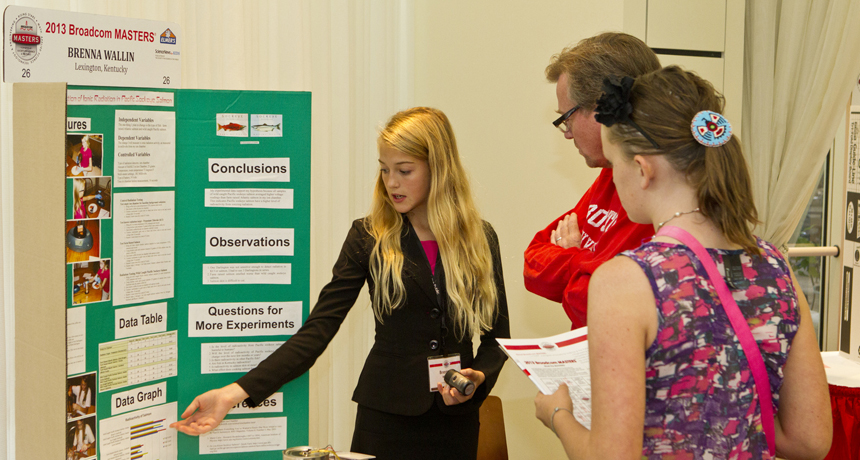Finding Your Eureka! Moment
Let’s start talking about research and how to find out about what most interests you

Brenna Wallin explains her "eureka moment" when studying radiation in sockeye salmon at the 2013 Broadcom MASTERS Finals in Washington, D.C.
SSP
As Science News For Students completes its makeover, I’d like to point out what you, as a student, can get out of Student Science and Eureka!Lab blogs.
Maybe you love science, technology, engineering or math. Maybe you hate them all. Maybe you’re not sure. In any case, Eureka!Lab is here for you! Last time, I talked a bit about Eureka! moments. For many of us, it may seem like an impossible dream to come up with a new discovery — maybe something only a genius could do. But it turns out, Eureka just means “I have found it!” It doesn’t matter whether what you have found is something entirely new or something new to you. And there’s no question that we can all find something new. We just need to learn how and where to look.
At Eureka!Lab, we’ll talk about finding Eureka! moments, those times where you realize you’ve discovered something new. I’ll use this space to talk about how other students have asked questions, found answers and then shared it with the world. Some present their findings at competitions like the Broadcom MASTERS or the Intel Science Talent Search. I’ll talk to people who participated in those competitions, and went on to become full-time professional scientists. A few of these young researchers have published their findings in scientific journals. I’ll talk to people in all walks of science life, because science careers can go from the field to the bench to the White House.
But this is more than science projects. We’ll see what science is happening now, what advances are being made, what news things are being found, and what it might all mean. I’d like to show you all types of science, from the serious to the silly, from how ballet dancers spinto how you might be able to walk on water (on the moon, anyway). And we’ll go behind the science headlines, to see how science papers come to be — where the ideas come from and how and why scientists chose to test those ideas.
Throughout it all, we’ll talk about how research works, by talking to people who do it every day.
And I’d like to involve you. I’d like to do Google Hangoutsand Ask-Me-Anythings, where you — the curious — can ask questions about what you’ve always wanted to know. What does it take to become a scientist or engineer? What types of fields do they work in? Where do they work? What is their daily life like? What does the “scientific method” really look like? How do you come up with a hypothesis, and figure out how to test it?
By looking at people doing science, asking them questions, and talking about the cool research that’s going on, I hope to inspire you to begin doing your own science. I want to help you find your own Eureka! moment.
But first, let’s start a conversation. Tell me: What do you want to know about science? Do you want to know how to become one? Or how to design an experiment? Then Eureka!Lab will do its best to bring you answers. I will try to find a wide range of answers. Because there is never just one way to do research. If you have questions, you can e-mail me at scicurious@gmail.com. Or send a tweet to me @scicurious. Together, we all can find a “Eureka!”
Power Words
Engineer: A person who uses science to solve problems. As a verb, to engineer means to design a device, material or process that will solve some problem or unmet need.
Eureka: an Ancient Greek word that means “I have found it!”
Hypothesis: A proposed explanation for a phenomenon. In science, a hypothesis is an idea that hasn’t yet been rigorously tested. Once a hypothesis has been extensively tested and is generally accepted to be the accurate explanation for an observation, it becomes a scientific theory.